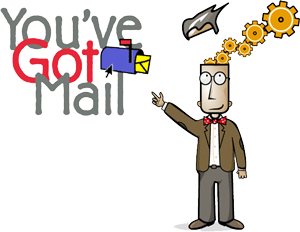 Advocates of using the email marketing to drive sales tend to have a small library of well-chosen facts at their fingertips.
Advocates of using the email marketing to drive sales tend to have a small library of well-chosen facts at their fingertips.
Check-out these eye-popping stats, for example.
Global email traffic stands at 166 billion emails a day; there are 3.84 billion email accounts – three times as many as all of Facebook and Twitter combined – and around 72 per cent of all users check their in box at least six times a day.
With a global average open-rate of around 20 per cent, about 5 per cent of these users click through to a web site in order to make a purchase and 83 per cent of this customer segment tend to have a higher propensity to spend more per transaction when marketed and sold to in this way compared to those who don’t land on the web site via an email message.
So it’s not surprising that a whopping US$2 billion globally is predicted to be spent by brand owners on email marketing over the next 24 months.
And on the surface, an investment in email marketing delivers a very healthy return compared with other sales and marketing channels.
And of course, it’s 100 per cent measurable.
Yet despite the efficiency and performance of this sales and marketing channel, there’s evidence that over-use of email marketing is starting to create what behavioural psychologists call ‘cognitive overload’.
The brain automatically gives credence to the latest input, not necessarily the most useful, with the result that the huge volume of data we now handle in our wired lives is rapidly becoming counterproductive.
Studies in this area forms part of our understanding of how the mind holds, retrieves and acts on information, sometimes referred to as decision science.
Research currently undertaken by the Center for Neural Decision Making at Temple University in Philadelphia, USA is attempting to unravel the mystery of why the human mind appears to give equal attention to an email selling timeshare apartments and a message about a family bereavement. “The web is creating cognitive overload and when we face that we make the poorest decisions in every aspect of our lives,” warns Professor Angelika Dimoka.
Joanne Cantor, a psychologist and author of Conquer CyberOverload says that the human brain can juggle only seven items at a time and often email arrives in mass batches that can overwhelm a person’s reason and judgment. “If you let things come at you all of the time, you can’t you can’t use additional information to make a creative leap – you need to take a break,” she says.
In a recent survey amongst 2,000 online adult consumers in the UK, 75 per cent said they resented a company that bombarded them with emails and 40 per cent of the respondents said they would refuse to share their personal details even if it meant missing out on special offers and price discounts as a result.
The answer to this, as discussed in High Impact Marketing That Gets Results, is for sales and marketing activities to have a higher degree of relevance for the recipient of the email, driven by customer intelligence as well as complying with the spirit as well as the fine print of data protection and other e-commerce regulations.














Recent Comments